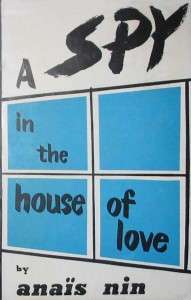A Spy in the House of Love
A Spy in the House of Love is a novel by Anaïs Nin published in 1954. Alongside her other novels, Ladders to Fire, Children of the Albatross, The Four-Chambered Heart and Seduction of the Minotaur, which were all first published in the United States between the 1940s and 1960s, A Spy in the House of Love was gathered into a collection of her novels known as Cities of the Interior.
 First edition (1954) | |
| Author | Anaïs Nin |
|---|---|
| Country | United States |
| Language | English |
| Genre | avant-garde |
| Publisher | Swallow Press (1954) Penguin (1973) |
Publication date | 1954 |
| Media type | Print (Hardback & Paperback) |
| Pages | 136 pp (first edition) |
| Followed by | Seduction of the Minotaur |
The novel follows the character of Sabina; a woman who dares to enjoy the sexual licence that men have always known. Wearing extravagant outfits and playing dangerous games of desire, she deliberately avoids commitment, gripped by the pursuit of pleasure for its own sake.
In A Spy in the House of Love, Anaïs Nin expressed her individual vision of feminine sexuality with a ferocious dramatic force. Through Sabina's affairs with four men, she lays bare all the duplicity and fragmentation of self that is involved in the search of love.[1]
Plot summary
The protagonist, Sabina, is a firebrand blazing through 1950s New York in the pursuit of her desires. The novel opens with her calling a random strangers' number, who happens to be a lie detector, in the middle of the night from a bar seeking to confess or find solace in the voice of a stranger. This same lie detector proceeds to follow Sabina in her activities throughout the novel. Her life becomes more and more complex the more involved she gets with her various love interests while trying to sustain her relationship with her husband, Alan, whom she feels she cannot live without. The level of deceit which she is forced to maintain with her hedonistic lifestyle leads her to regard herself as "an international spy in the house of love".
Reception
In a brief review, John L. Bradley referred to the novel as "Tentative, experimental, complex [...] a commendalbe effort to explore new frontiers of the modern novel."[2]
Cultural references
- The British band The House of Love is named after the novel.[3]
- In The Simpsons episode "Half-Decent Proposal", Moe Szyslak refers to Artie Ziff by saying, "He's like a spy in the house of Moe."
- The TV series Dollhouse uses the phrase as the title of its ninth episode.
- French Fashion Designer, Olympia Le-Tan, creates clutches using covers of classical literature and used "A Spy in the House of Love" for her latest collection.
- Songs
- Steve Winwood recorded a song called "Spy in the House of Love".
- The American band The dB's also recorded a song titled "A Spy in the House of Love" on their album Like This.
- The phrase was used as a lyric in The Doors' song "The Spy" on the album Morrison Hotel.
- "Spy in the House of Love" is also the title of a song by the band Was (Not Was) released in 1987.
- The band Animal Logic also released a single entitled "There's A Spy (in the House of Love)."
- The phrase was used as a lyric in Anaïs Mitchell's song "Namesake" on the album The Brightness.
- Carly Simon quotes a line from the book "I am an international spy in the House of Love", in her 1979 album Spy.
- Ruby Throat reference the title of the book in their song "A Spy in the House of Thieves" on their album The Ventriloquist.
- Lush song COVERT written by Miki Berenyi was inspired by the book and ends with the line "I am the spy"
References
- Nin, Anaïs Nin (2001). A Spy in the House of Love. Penguin. ISBN 978-0-14-118371-8.
- Bradley, John L. (Summer 1955). "Reviewed Work: A Spy in the House of Love by Anaïs Nin". Books Abroad. 29 (3): 1. doi:10.2307/40094666. JSTOR 40094666.
- Sturges, Fiona (14 April 2005). "The House of Love: Bless this house". The Independent. London.